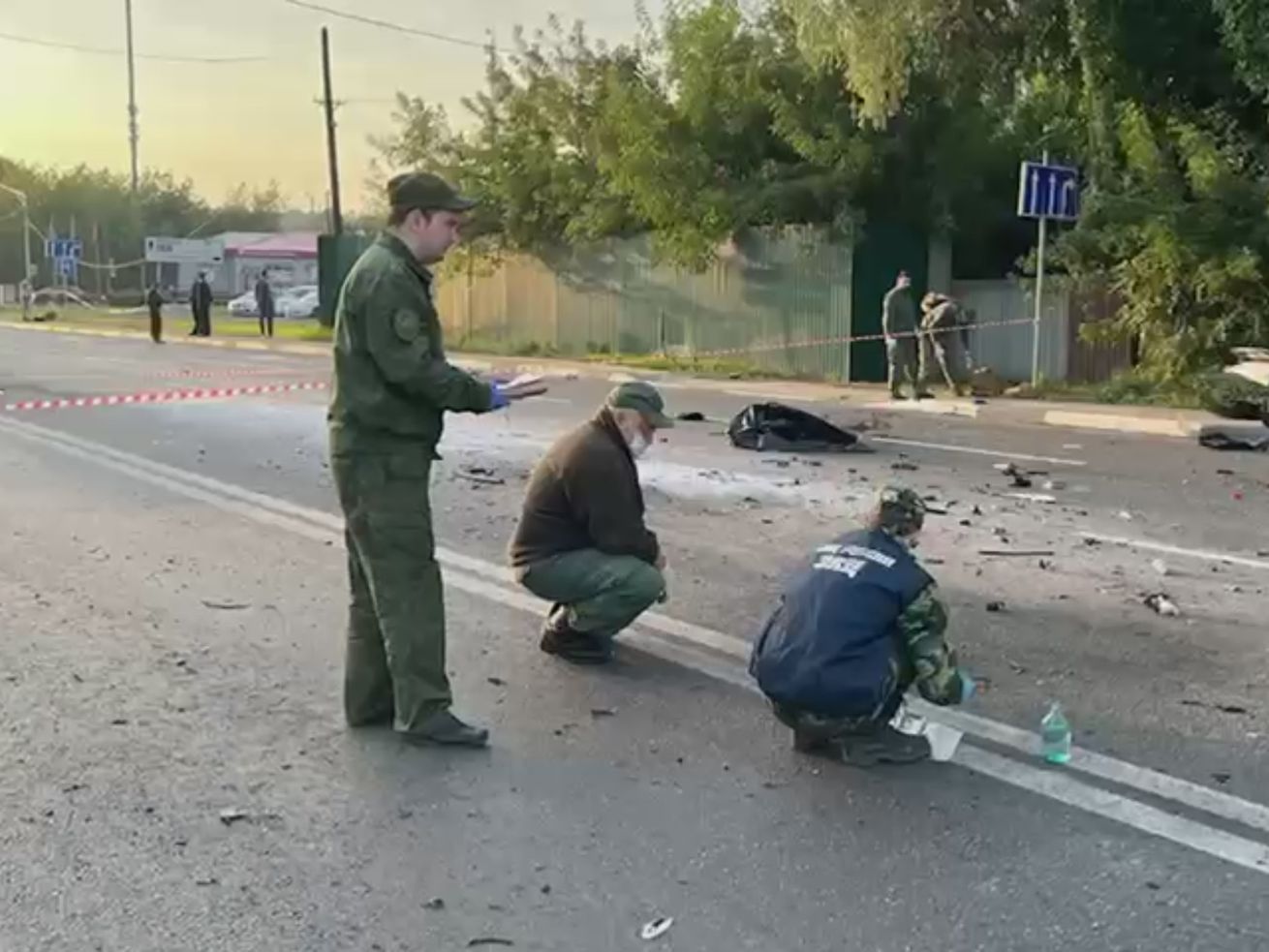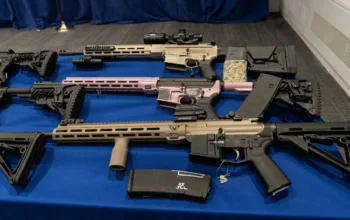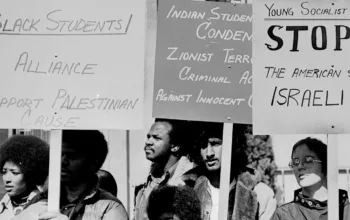A Russian politics expert explains how much is still unknown about the murder of Darya Dugina.
Over the weekend, a car exploded along a Moscow highway. Inside was Darya Dugina, the daughter of an ultranationalist ally of Russian President Vladimir Putin.
Dugina, though lower profile than her father Aleksandr Dugin, espoused many similar nationalist and pro-war beliefs and had been sanctioned by the United States for running a disinformation website. Russia is blaming Ukraine for Dugina’s death, and it’s already prompting recriminations between the two countries — and fears of escalation.
“Our hearts yearn for more than just revenge or retribution,” Dugin said in a statement Monday that added to those fears. “It’s too small, not the Russian style. We only need our Victory.”
Russia’s security agency, the FSB, says its two-day investigation found that “Ukrainian intelligence agencies” planned the attack, and a Ukrainian woman who entered and then fled through Estonia carried it out. Ukraine denies involvement and points the finger back at Moscow; a Ukrainian official on Monday called the attack part of an “intraspecies” fight among Russian elites. Meanwhile, a new supposed anti-Putin underground group tried to claim responsibility Monday.
It’s far too early to know who’s behind the attack, said Brian Taylor, a political science professor at Syracuse University and an expert in Russian politics. In fact, we may never know. With other recent assassinations in Russia with high political stakes, including opposition politician Boris Nemtsov in 2015, “the investigation usually ends up only going so far.”
Right now, “a lot of the speculation is simply that: It’s speculation trying to figure out, ‘Well, who might have had a motive to do that, and what that motive might have been,’” Taylor said.
Vox spoke to Taylor to dig into what we know about Dugina’s murder, the plausible explanations, and why the fallout might be felt most in Russian society rather than in the war in Ukraine.
This conversation has been lightly edited for length and clarity.
Caroline Houck
So before we get into the actual attack and what we do or don’t know about it, I wondered if you could explain who Darya Dugina was. Obviously, any car bombing would make headlines, but why has her death in particular been so shocking, both domestically and internationally?
Brian Taylor
I think Dugina’s death has caused so much tension more because of who her father was than who she was. She was relatively new as a media personality and did not have the level of visibility that her father did.
And the thing about her dad is that there’s a lot of different opinions out there about Dugin and how important he was in Russian internal politics. My sense of Dugin himself was that a lot of times in the West, his influence in Russian domestic politics was vastly overinflated, and that it’s not accurate to refer to him as someone being close to Putin, or “Putin’s brain,” or “Putin’s Rasputin,” or whatever label that you want to put on it. He at a couple of times was useful to the regime, especially in 2013-2014, but he was always a bit too out there to be incorporated into the media mainstream. He is appealing to a certain segment of right-wing Christian Russian nationalists, with very authoritarian, very militaristic kind of viewpoints.
And his daughter was in a similar vein, occasionally appearing on some of the television talk shows and talking a similar line about the need to wipe out Ukraine and that kind of thing. But she was not one of the big media personalities that was a leading voice with close ties to the Kremlin. So, in that sense, it’s sort of hard to explain why this is such a big deal, other than because of who her father was. And because Russia is at war right now, and because this happened in Moscow, in a place close to where members of the Russian elite live. So in that sense, the reverberation from it is almost incidental to who she herself was, and I don’t mean that in a disparaging way.
I think we have to say that the impact isn’t so much about her but about the timing, the location, and who her father was.
Caroline Houck
That for me raises the question of, well, who would want to kill her? I mean, there’s obviously a lot of theories out there right now: Russia is saying Ukraine did it; Ukraine is saying Russia did it. And there’s this supposed anti-Putin group that is coming out of the woodwork trying to claim credit. Do any of these theories seem credible to you?
Brian Taylor
Honestly, I think it’s super hard to know this early what the correct explanation is. We don’t even know if they were trying to kill her or if they were trying to kill her father. So that’s probably the first starting point: Who were they trying to kill (whoever “they” is)?
Caroline Houck
Right. Just to interject, because Dugina and her father were at an event together earlier that evening.
Brian Taylor
Yeah, they were at an event together. And at least some of the initial reports suggested he was supposed to be traveling in that car, and then at the last minute went in a different car. So, yeah, it’s not obvious who the target was.
In terms of the theories, the thing I would emphasize is: We probably aren’t going to know any time soon definitively who was behind it. And so a lot of the speculation is simply that. It’s speculation trying to figure out, well, who might have had a motive to do that, and what that motive might have been.
Having said that, I think we can divide the types of explanations up a bit. So the one that the Russian government, in terms of the FSB, is promoting is that Ukraine is behind this attack. And if we think about why would this be in Ukraine’s interest, I’m having a hard time seeing that story. If the Ukrainian secret services are capable of carrying out assassinations near Moscow, it’s not obvious to me why either Dugina or Dugin would be who they would go after. And the evidence that’s been put forward — such as it is — by the FSB doesn’t look particularly convincing at this point.
So I think it’s more likely there’s some kind of internal Russian explanation for the murder. But even then, there are a whole range of possible candidates with a whole range of possible motives. Sometimes these things in Russian politics are political; sometimes they’re economic; sometimes it’s a combination of the two. The explanations in terms of politics go from false flag effort by the government to opponent of the government. So you’ve got a whole constellation of different possible explanations and motives. And as far as I can tell, so far this early, we just don’t have enough evidence to say which of those seems most credible.
Caroline Houck
So it’s going to take some time to get to know what happened, if we ever do. Historically, with other assassinations in Russia, what have we been able to learn, and what should we expect in terms of getting to the bottom of this?
Brian Taylor
I think we could look at both, you know, political murders in Russia — in and around Moscow — and also perhaps ones in the Donbas.
There have been various warlords and political figures killed [in the Donbas] since Russia started the war there in 2014. And always very murky kind of what was behind it, who the actual perpetrator was, with some people blaming it on Ukraine in those circumstances and other people saying it’s some kind of either legal or political or economic thing going on, like turf struggles for control of economic flows and that kind of thing.
In the Moscow cases, it’s often opponents of the regime. And, you know, the most famous ones are the attempt to kill Navalny, the murder of Boris Nemtsov, [and] the murder of Anna Politkovskaya, the journalist.
The Nemtsov one is sort of a good illustration of how these things often happen, where there are different theories put out there about who’s behind it. There’s clearly high political stakes involved in it. And the investigation usually ends up only going so far, right? So, someone gets put in jail for being the trigger person. But you never find out who was actually the person who ordered the thing to take place.
And in the case of Nemtsov, the threads went to Chechnya. And then the question was, how close did they go to [Ramzan] Kadyrov, the warlord/governor of Chechnya? And if they go to Kadyrov, do they go beyond that? Do they go higher in the Russian state? So the thread always runs cold, once you get past the functionaries. So it seems surprising that the FSB would have cracked the case in less than 48 hours in this case.
Caroline Houck
So how should we think through what people continue to say, what different sources continue to say — what the FSB says, what Putin says — going forward?
One of the things that people are worried about is that this could be used as a pretext for an escalation in the war on Ukraine. Whether you think it was a false flag by the government itself or not, it could always be used as a pretext anyway. So what should we look for in Russian domestic politics in the next 48 hours, next week or so, on how this murder is talked about?
Brian Taylor
Yeah, I think a lot of the conversation has already moved to what are the implications of this, regardless of who did it. How will it be used by various actors and by the Russian state?
So clearly, we see a lot of this sort of strident regime propagandist types arguing for hitting harder at Ukraine because of this, without any real hesitation about thinking through whether it even makes sense that there’s a Ukrainian trace to this. So it could be used for that reason.
But then, the question is what does it even mean to talk about escalation in a Ukrainian context. Russia has been bombing the crap out of Ukraine for the last six months and has displaced literally millions of people and killed tens of thousands of people. [It] has hit civilian targets again and again and again, whether it’s hospitals or schools or apartment buildings or malls or whatever. So what does it mean to say they’re going to “escalate,” especially at a time when, as far as the military analysts can tell, they’re having trouble putting forces in the field, they’re having trouble finding soldiers, they’re having trouble with equipment losses, and that sort of thing.
The other question then is: How is it used in terms of Russian internal politics? I think what a lot of people are worried about is that this will be used — even if this was not the origins of it — as an excuse to go even harder against any internal opponents of the war. The question is, if they’re going to tighten the screws further internally, where do they go next? Because they’ve already, you know, banned all opposition media, chased many opposition politicians out of the country, there are people awaiting trial. So there are other people that could arrest but it would have nothing to do with this bombing. So would it just be the atmosphere? You know, a “make the public more alarmed” kind of thing. But I guess I don’t really see [that]. Unless they want to use it as an excuse to go after a certain group that isn’t clear yet. So I think we’re going to have to watch and see whether there is more done internally to try and go after opponents of the war.
The other thing I would say that we should be paying attention to, maybe not in the coming days but in the coming weeks, is if this is an indication of some kind of inter-regime power struggle or fight, and the murder was just some sort of side-shoot of that.
So then we’d be in the murky world of the various courts of agencies inside the state that sometimes clash with each other, and quasi-state organizations like the Wagner group. We’d be getting into what Russian politics people often refer to as “clan battles” that are going to be escalating because of this. So that would be another possible angle, not the false flag angle so much but the angle that this is evidence of the state and sort of state-affiliated actors starting to split and fall apart over the course of the war. And there’s some kind of power struggle going on inside those circles that we simply don’t know what they are. But maybe in the coming weeks, it’ll become more clear if that’s the reason behind the murder.
Caroline Houck
When it comes to those kinds of struggles, those internecine struggles, would they be ideological, about pursuing each faction’s own interests, trying to grapple for power? Are there specific impetuses for it, or is it a general thing of, now we’re six months into the war and any unity is going to start getting taxed?
Brian Taylor
There’s potential ideological [divides], potential struggles for power and influence and infighting about, you know, who screwed things up or who’s going to be taking the lead going forward. I would not rule out overlapping political and economic motives because a lot of times these structures are not only, you know, part of the executive branch or quasi-attached to the executive branch, but they’re also entangled informally with various economic schemes to try and profit either off some subset of the agency or some actors within any particular agency or grouping.
This, I should say, is something that we’ve seen over the decades. So it’s just more dramatic now because it’s in the context of this massive war. And in the context of a real potential crisis moment for the Russian state and the Russian regime, where they launched this massive war, they thought it was going to be easy, it’s turned out to be very, very hard and costly. And so there could be recriminations.
Caroline Houck
So we might be being teed up for a more unstable period in Russian domestic politics.
Brian Taylor
I think that’s certainly one possibility. I think it’s possible that this is just going to be an episode that comes and goes, and then in a few weeks, everything has moved on and nothing much has changed. The more dramatic possibility is this is the start of a much bigger story and a bigger period of instability and infighting inside the Russian elite and inside the Russian state. I don’t have any strong priors at this point which of those it might be. But I think that’s what we would want to look for in the coming weeks. Is there some kind of evidence of this leading to subsequent events, that all have a common thread that we can’t see at this point?
Caroline Houck
Is there anything people should think about as they seek and follow news developments in this?
Brian Taylor
The only thing I would add is: Lots of things happen in Russian politics where we want to understand what was going on there. And I’ll remind us of Churchill’s quote about [Kremlin political intrigues resembling] bulldogs fighting under a carpet: “An outsider only hears the growling, and when he sees the bones fly out from beneath it is obvious who won.”
The idea is there’s this fight going on, and we shouldn’t necessarily expect that we’re going to know what was behind it until quite a bit later. And maybe that’s not satisfying. But I would counsel patience and skepticism about what comes out.
Author: Caroline Houck
Read More



